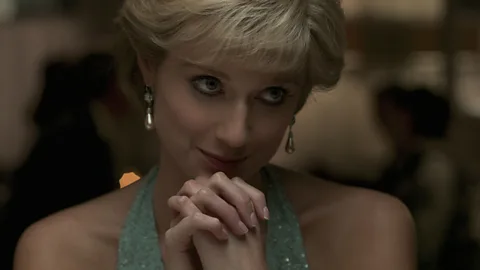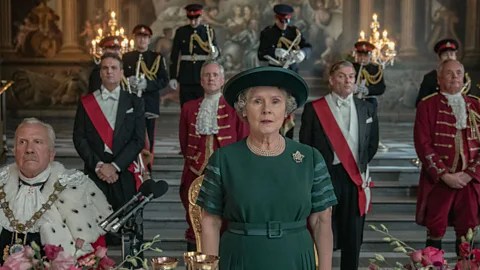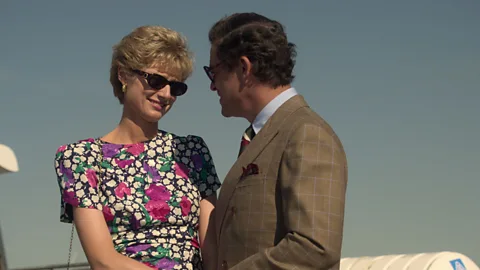The Crown series 5 review: 'Gripping, but badly-told soap'
 Netflix
NetflixWith an all-star cast featuring Imelda Staunton, Dominic West and Jonny Lee Miller, Netflix's royal saga has now reached the 1990s and the then Prince and Princess of Wales' divorce. But for all the high drama, it suffers from increasingly lazy writing, writes Hugh Montgomery.
Five series into The Crown, and it has now reached the juncture that has long been anticipated. For if the Netflix saga about the British Royal Family initially began as a rather stately, arguably somewhat hagiographic, piece of work, then there was always the expectation of high drama ahead when it reached the 1990s – the decade in which the royals really became treated as celebrities, largely due to the "War of the Wales", aka the very public implosion of the then Prince and Princess of Wales' marriage.
More like this:
So it is that, this latest batch of 10 episodes – in which the cast is reset once more, with Imelda Staunton newly installed as The Queen – is already mired in more controversy than all the previous seasons combined, its timing so soon after The Queen's death adding to the anxiety around their release. So far, we've had former Prime Minister John Major (played in the show by Jonny Lee Miller) describing it as a "barrel-load of nonsense" for its suggestion that back in 1990, Prince Charles wanted to get The Queen to abdicate with his help. Meanwhile no less than alternative British royalty Judi Dench has written an open letter dubbing it "crude sensationalism", leading to Netflix inserting a notification on the trailer emphasising it is a "fictional dramatisation", and royal commentators have suggested how "furious" the Duke of Cambridge will be at the show's recreation of the infamous 1995 interview between his mother and now discredited BBC journalist Martin Bashir. It's just possible, however, that his father may be less furious at being portrayed by that quintessential upper-crust charmer Dominic West.
 Netflix
NetflixSo to address the big question of the moment: should The Crown and its creator Peter Morgan be playing so fast-and-loose with the facts? On the one hand, you can argue that to accuse The Crown of being overly-fabricated is to miss perhaps its key raison d'etre – which is surely to imagine what we could never hope to know through the historical record, the intimate exchanges that go on behind palace doors. It's this kind of creative speculation that results in the season's single greatest scene dramatically: a scintillatingly tense, yet even-handed encounter between The Queen and Princess Diana in the run-up to the Bashir interview, in which Staunton and Elizabeth Debicki as the latter tear your sympathies in two.
But where the facts are jumbled up, or simply disregarded, it does seem valid to question why – and for what benefit. And without adjudicating every single narrative choice, the show is evidently content to deviate from the truth in a wilfully indiscriminate manner: take the first episode, whose abdication plot is predicated on the shock of a Sunday Times poll that apparently suggested the monarchy was under such threat, it caused Prince Charles to move against his mother. Except you can look up the reporting of that poll now in The Times archive, to find a very blandly positive piece whose topline is that "the Royal Family enters the 1990s as a remarkably popular part of British life" and records that nine out of 10 people felt very or mainly favourable about The Queen. And while the article does a few paragraphs down cite the statistic mentioned in The Crown that almost half would an early abdication, it includes the important words "at some stage" – which is rather different to how it is couched on screen as a more pressing desire, alongside suggestions the public deemed The Queen by this stage "irrelevant", "old" and "expensive".
Ethical considerations aside, why all this mendacity matters artistically is that it is symptomatic of the show's most fundamental creative failure, here more glaring than ever: its sometimes excruciatingly lazy way with storytelling. Where reality might be too nuanced, the show goes for shortcuts, overwriting and falsely interconnected storylines. From discussion about The Queen's ailing popularity being parallelled with the problems of her beloved yacht Britannia ("She's a creature of another age… in many ways she's obsolete," says the late Duke of Edinburgh, lest it wasn't clear) to an extended scene of Prince William being taught about wannabe Establishment-destroyer Guy Fawkes just as his mother and Bashir are preparing to record their interview on 5 November, clunking analogies are rarely avoided, which would be fine as a sentence in a history book, but here are writ as large, and laboured as heavily, as possible. And when characters aren't talking in unwitting metaphor, they're increasingly prone to spewing out chunks of opinion like frustrated newspaper columnists.
A shift in focus
That all said, this series, when it hits its stride in the second half at least, is compelling as soap opera. Where the show has previously used the royals as a prism through which to explore national and geopolitical history, it now feels hermetic and insular, at once a family psychodrama and the story of an institution contending with internal dysfunction.
A lot of attention will be paid to its depiction of the relationship between Queen and heir – in episode four, we get the already revealed line from Prince Charles to his mother that "if we were an ordinary family and social services came to visit, they'd have thrown us into care and you into jail!". But even more bracing – nay Bergman-esque – is its portrayal of the union between Queen and Consort. They are by this stage, it is suggested, two people with increasingly nothing in common, with Prince Philip in particular unable to contain his disenchantment: sure to be especially controversial is the imagined scene in which he, with a faintly sinister imperiousness, insists not only that he will not relinquish his close bond with his "spiritual companion" Penny Romsey (played by Natasha McElhone), but that The Queen must be seen to befriend her in order to defuse unwanted gossip.
 Netflix
NetflixMeanwhile it's the "War of the Wales" that predictably provides the series with its real dramatic momentum, as the enmity builds through a disastrous "second honeymoon" through the publication of Andrew Morton's Diana: Her True Story, the "Camillagate" tapes, Prince Charles' mildly confessional interview with Jonathan Dimbleby – and then, of course, Princess Diana's much more confessional one, whose controversial procurement, filming and screening takes up two episodes. With a report on Bashir's duplicitous behaviour having only been released last year, these instalments have an additional contemporary frisson as they portray supposed internal wranglings within the BBC around the scoop. (What the then-director general John Birt might make of the implication that he partly commissioned the interview to spite the royal-associated then-chairman Marmaduke Hussey will be interesting to see).
But for all that Prince Charles and Princess Diana had one of the most extraordinary marriages in human history, the show does well to suggest how it might have been simultaneously sad in extremely ordinary ways: it's a point poignantly made, in particular, through a conceit in which fictional couples whose divorces were stamped on the same day detail their own marital breakdowns. And while there had been some speculation that this current series might prove the very worst of PR for the new King, in fact, on top of championing his progressive values and work with The Prince's Trust, its arbitration of the Wales' marriage feels very equitable. One scene between them that sticks out for its unadorned sadness comes in the penultimate episode when an attempt at a truce, made over a plate of scrambled eggs in Princess Diana's Kensington Palace flat, suddenly descends into recrimination: here, the show suggests, were two people that, through no singular fault, simply could never have been compatible.
As for the performances? They are, this time round, a very mixed bag. Inevitably it becomes harder for each new round of actors taking on royal duties to convince, as what happens on screen converges with more and more viewers' real-life memories. Regardless, some performances here really just don't work. That applies to Lesley Manville as Princess Margaret, who brings a strangely prim, pinched quality to the famously larger-than-life royal sibling. Equally, West as Prince Charles is all wrong: where his predecessor Josh O'Connor disappeared into the role, perfectly capturing the prince's unworldly diffidence, among other things, West isn't able to quell his roguishly assured star charisma.
Those actors who fare better, by contrast, are ones who don't themselves have such an established persona to conceal. The relatively little-known Claudia Harrison follows Erin Doherty as another inspired choice for the Princess Royal, a perfect balance of severity and warmth, while Jonathan Pryce as Prince Philip offers a masterclass in creating a convincing impression of a person without looking anything like them, and Debicki pretty effectively inhabits Princess Diana using a more obviously studied mimicry (the eyes directed upwards, the ethereal, slightly wooden intonation). And as for Staunton? At first, she seems badly miscast, somehow both too naturally bullish and too knowing. Yet, as the series goes on, she's a performer of such intense conviction that the question of how much her Queen is really the Queen becomes increasingly less important.
Come the final episode of this series, a sense of déjà vu takes hold, as Tony Blair (Bertie Carvel) arrives in power and Princess Diana is seen packing her bag for a visit to Mohamed Al-Fayed's yacht, where she will encounter his son Dodi – because, of course, in its due-to-be-final next series, The Crown is set to cross over with The Queen, Morgan's fine, Oscar-winning 2006 film about the aftermath of Princess Diana's death, which was the first fruit of his interest in Britain's ruling family. I suspect the comparison with that rather more sophisticated work will do The Crown no favours at all – though regardless of that, as an incontrovertible TV "event" that is also a fail-safe controversy machine, it will undoubtedly have the world rapt until the very end.
The Crown series five is released on Netflix on 9 November.
★★★☆☆
Love film and TV? BBC Culture Film and TV Club on Facebook, a community for cinephiles all over the world.
If you would like to comment on this story or anything else you have seen on BBC Culture, head over to our Facebook page or message us on Twitter.
And if you liked this story, sign up for the weekly bbc.com features newsletter, called The Essential List. A handpicked selection of stories from BBC Future, Culture, Worklife and Travel, delivered to your inbox every Friday
